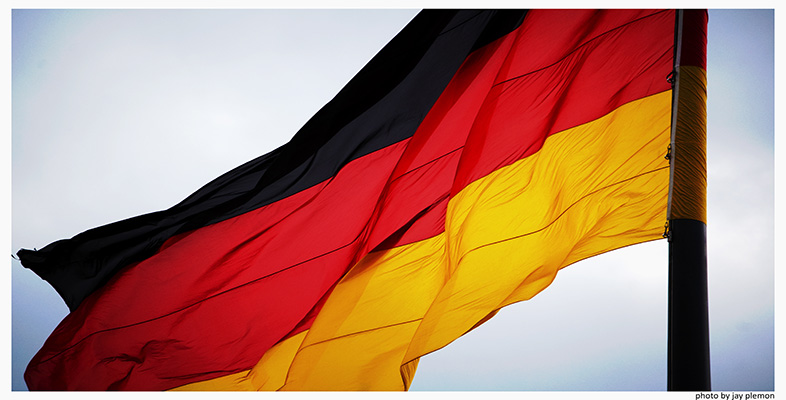4.2 Café conversations
Übung 25
Listen to this conversation in a café. Try to work out the meanings from the context without using a dictionary. Then do the quiz below.
Transcript: Übung 25
Abschnitt 14
Hören Sie bitte.
Using the following two lists, match each numbered item with the correct letter.
stimmt so
sonst noch etwas
zwei Stück Apfelkuchen
ein Glas Tee
Ich möchte zahlen, bitte
das macht
mit Sahne
ein Kännchen Kaffee
mit Zitrone
zusammen oder getrennt
entschuldigung
wir möchten
a.a glass of tea
b.that comes to
c.anything else?
d.with lemon
e.two pieces of apple cake
f.keep the change
g.we'd like
h.excuse me
i.I'd like to pay, please
j.with cream
k.together or separately
l.a pot of coffee
- 1 = f
- 2 = c
- 3 = e
- 4 = a
- 5 = i
- 6 = b
- 7 = j
- 8 = l
- 9 = d
- 10 = k
- 11 = h
- 12 = g
Übung 26
Listen to the audio again (and look at the transcript if you'd like). The waitress says bitte schön twice. Can you guess from the context what the phrase means in each case (two different meanings)? Write down what you think the different meanings are.
Lesen Sie und schreiben Sie.
Transcript: Übung 26
Answer
Bitte schön? – Yes, please? (How can I help you?)
Bitte schön. – Here you are. (When handing something over.)
There is a third situation where bitte schön commonly occurs – in response to danke schön it means ‘don’t mention it’ or ‘you’re welcome’.
Übung 27
Here are some extracts from everyday café conversations with a few key words missing.
Use some of the phrases you have learned to fill in the gaps.
Lesen Sie und schreiben Sie.
GAST: Entschuldigung! Die Speisekarte, bitte!
KELLNER: Ja, sofort. … Bitte _____.
(später)
KELLNER: Möchten _____ bestellen?
GAST: Ja, ich _____ einen Kaffee, bitte.
KELLNER: Eine Tasse oder ein _____ ?
GAST: Eine Tasse, bitte.
KELLNER: Sonst noch _____ ?
GAST: Nein, danke.
(später)
KELLNER: Bitte schön?
GAST: _____, bitte.
KELLNER: Das _____ €2,50, bitte.
GAST: €3,00 – _____ so.
KELLNER: Vielen _____. Auf Wiedersehen.
Answer
The full text is given below. Check that you used capital letters in the right places.
GAST: Entschuldigung! Die Speisekarte, bitte!
KELLNER: Ja, sofort. … Bitte schön.
(später)
KELLNER: Möchten Sie bestellen?
GAST: Ja, ich möchte einen Kaffee, bitte.
KELLNER: Eine Tasse oder ein Kännchen?
GAST: Eine Tasse, bitte.
KELLNER: Sonst noch etwas?
GAST: Nein, danke.
(später)
KELLNER: Bitte schön?
GAST: Zahlen, bitte.
KELLNER: Das macht €2,50, bitte.
GAST: €3,00 – stimmt so.
KELLNER: Vielen Dank. Auf Wiedersehen.
Having coffee and cakes with friends in a café or at home is a very popular way to take a late afternoon break in Germany.
Übung 28
Now it's your turn to play the customer's part, using your script from Übung 27. Speak aloud as you play the audio.
Hören Sie und sprechen Sie. Sie sind der Gast. Hier ist ein Beispiel.
Sie sagen: Entschuldigung! Die Speisekarte, bitte.
Sie hören: Entschuldigung! Die Speisekarte, bitte.
Transcript: Übung 28
Abschnitt 15
Hören Sie und sprechen Sie. Bitte beginnen Sie jetzt.
